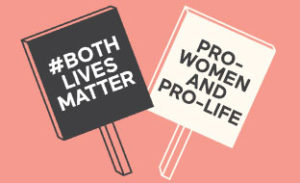One of the central claims of the pro-choice movement is that the right to choose is a basic right which one has in virtue of what one is. The individual in question is a human being, i.e. a substance of a rational nature. As such, one of the essential features of being human is being a moral agent, i.e. being an agent capable of forming an intention to act and acting accordingly. Hence choice is an essential feature of rational agency. Not to recognise a right of choice is to treat the person in question as something less than human, which is morally wrong. Therefore, a basic condition of moral uprightness is that the choices of the individual involved be respected, including the choice to terminate a pregnancy.
Furthermore, it can be said that whilst choice is only a necessary but not sufficient condition for an action’s being a good one, its necessity for an action entails that by restricting choice one is restricting the sorts of moral actions one can perform. So in limiting an individual’s choices, one limits their ability to act as a moral agent.
On the contrary, whilst choice is a necessary condition of moral agency, it is not a sufficient condition for moral goodness. This is because the uprightness of a moral action does not depend on its being chosen, but on the kind of action that it is. Hence it is not simply in virtue of an action’s being chosen that it is morally acceptable, but in virtue of what kind of choice is made that determines the action as good or bad accordingly. So outside of the issue of abortion, there are all sorts of actions which are recognised as good actions, not simply because they are chosen, but because they are the kinds of actions that are good.
Not only that we must distinguish between limiting the actions that an agent can perform and limiting a person’s moral agency.
By limiting the actions a person can perform, what we do is recognise that there are some actions that given their nature ought never to be performed and so society takes steps to ensure that they cannot be performed; and there are all sorts of uncontroversial examples of this. Crucially however, this is not the same as limiting a person’s moral agency, since moral agency is not simply an ability to make choices, but revolves around the kind of choices one makes.
So, if one makes all sorts of bad moral choices, one compromises one’s moral agency, even though one is engaged in making choices. Hence it is not problematic to limit the choices one can make, only that the limits on choices are morally justified, i.e. if such a choice is of the kind that ought never to be performed.
Concerning abortion then, limiting an agent’s choices so that abortion is impermissible, will only be acceptable if the act of abortion itself is an action that ought never to be performed. But the act of abortion is one that ends the life of something subject to a right to life; and the taking of the life of something subject to a right to life is an action that ought never to be performed. Consequently, abortion is an action that ought not to be performed, in which case its limitation by society is not a restriction of moral agency but a restriction on the kinds of choices one can make.
With thanks from all of us at Both Lives Matter to our guest author, Dr Gaven Kerr.
Gaven has authored a number of peer reviewed articles on various issues in philosophy, and has published a book with OUP, Aquinas’s Way to God (2015) with another forthcoming with OUP in 2019. He is a member of the Dominican Order, and works for the Christian think tank, the Iona Institute.
The views and opinions expressed, are those of the author/s and do not necessarily reflect the official policy or position of Both Lives Matter.

